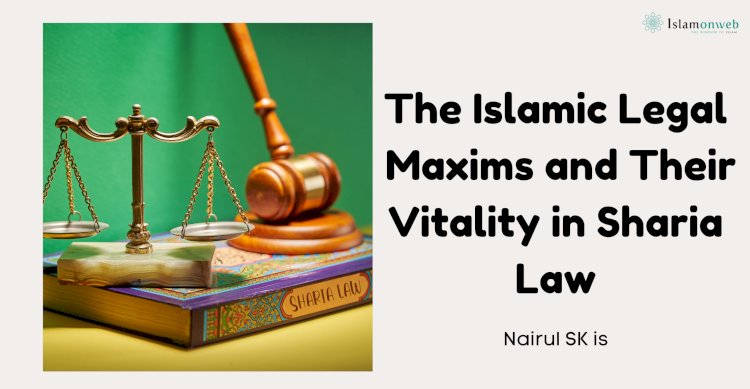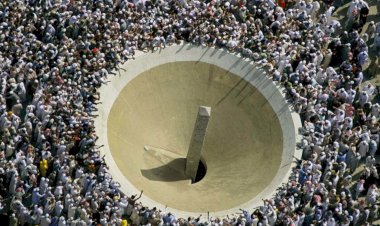The Islamic Legal Maxims and Their Vitality in Enabling the Legislation of Sharia Law
The Qawa'id al-Fiqhiyyah (Islamic Legal Maxims) were established by prominent Muslim scholars from all major schools of thought, including Imam Abu Hanifa of the Hanafi school, Imam al-Shafi'i of the Shafi'i school, Imam Ahmad ibn Hanbal of the Hanbali school, and Imam Malik ibn Anas of the Maliki school of jurisprudence. In the early stages of Islamic legal development, the entire Muslim Ummah referred to the Madina School of Fiqh, led by Imam Malik ibn Anas, and the Basra School, led by Imam Nu'man ibn Thabit, known as Imam al-A'zam (Abu Hanifa). The 1st and 2nd centuries A.H. (After Hijra) saw significant growth in Islamic jurisprudence, largely through the scholarship of Imam Abu Hanifa and Imam Malik ibn Anas, who were based in Iraq and the city of Madina, respectively.
Chronologically, Imam Abu Hanifa and Imam Malik ibn Anas were contemporaries, born in 80 A.H. and 93 A.H. respectively, and passing away in 150 A.H. and 179 A.H.[1] As Islamic dominance continued to prevail across the world, the growth and acceptance of Islamic jurisprudence flourished. New fiqhi rules and Islamic legal maxims were developed in response to emerging social, political, economic, and humanitarian challenges. Notably, every single Islamic legal maxim has been derived from the revealed evidence in the Qur'an and the authentic Hadith of the Prophet Muhammad (PBUH).
Meaning and Significance of Islamic Legal Maxims
For many reasons, Islamic Legal Maxims are significant and hold great importance in facilitating the legislation of Sharia law. They are vital for *fuqaha* (Islamic jurists) when issuing rulings, particularly in cases where there is no specific revealed text to support the legislation. These maxims are defined as general principles, expressed in concise texts, that encompass broad Sharia rulings applicable to various cases falling under their subject matter.
Alternatively, they are general rulings through which the judgments of incidents that are not explicitly mentioned in the Quran, Sunnah, or Consensus can be known. A jurisprudential rule is a ‘Sharia Ruling’ on a majority issue from which the rulings of the particular issues that fall under it can be derived’.[2] For kind information, there are myriads of such Sharia Rulings (Qawaid Fiqhiyyah) which have been framed based on the Quranic revelations, Prophetic Sunnah (Hadith) and the Unanimous Consensus and in that capacity, it is not possible to discuss all of those Qawaids but the most notables are inevitable. It has gigantic significance for both the Fuqaha, Learners and the Muslim Societies. The below lines shortlist its most notable importance with serial numbers.[3]
- Practical Application: Facilitates the practical application of Sharia Rulings in a flexible and practical manner, achieving the purposes of Sharia and addressing changes and new developments in life.
- Easing and Removing Hardship: Contributes to easing Sharia rulings and removing hardship from those obligated, such as the rule "hardship brings ease," used to lighten rulings in cases of difficulty and necessity.
- Facilitating Understanding: Provides general principles that help jurists and learners understand various branches of jurisprudence, making them easier to remember and apply.
- Deriving Rulings: Assists jurists in deriving Sharia rulings for new issues based on general principles, contributing to the development and updating of jurisprudence.
- Organizing Jurisprudence: Helps organize and unify Islamic jurisprudence, avoiding major contradictions and differences among jurists on some issues.
Note: These notable importance and significance of Qawaid are not limited and static but dynamic and progressive as progressive as long as the lifestyle changes from a culture to another culture and period to period.
The Most Notable Qawaid Al-Fiqhiyyah
- "Matters are judged by their objectives" (قاعدة الأمور بمقاصدها)
- "Hardship brings ease"
(قاعدة المشقة تجلب التيسير)
- "Necessities permit the prohibited"
(قاعدة الضرورات تبيح المحظورات)
- "Custom is a basis for judgment"
(قاعدة العادة محكمة)
- "No harm and no reciprocating harm"
(قاعدة لا ضرر ولا ضرار)
- "What is necessary for the completion of an Obligatory is Obligatory"
(قاعدة ما لا يتم الواجب إلا به فهو واجب)
- "The default in things is permissibility"
(قاعدة الأصل في الأشياء الإباحة)
- "Harm must be removed"
(قاعدة الضرر يزال)
- "Prevention takes precedence over removal"
(قاعدة الدفع أقوى من الرفع)
These are not merely ordinary Islamic Legal Maxims that facilitate the legislation of Sharia law to address challenges and issues faced by the Muslim Ummah, particularly when newly emerging matters arise. There are numerous Islamic Legal Maxims (Qawa'id Fiqhiyyah) that similarly provide solutions to both contemporary and traditional issues, offering new rulings as required by the times. As previously mentioned, it is impossible to cover all these maxims in this article. Therefore, the writer will focus on a selected few that are comprehensive enough to provide an understanding of Qawa'id Fiqhiyyah and their essential role in facilitating the legislation of Sharia law.
- "Certainty is not removed by doubt" (اليقين لا يزول بالشك)
As a traditional evidence, Prophet Muhammad (PBUH) said: "Abu Sa'id al-Khudri reported: The Messenger of Allah (may peace be upon him) said: When any one of you is in doubt about his prayer and he does not know how much he has prayed, three or four (rak'ahs)”. he should cast aside his doubt and base his prayer on what he is sure of.".[4] This hadith indicates that in the case of doubt about the number of prayer units, the decision should be based on what is certain (the lesser number), and doubt should be discarded. While the revealed evidence of Quran, Allah says, "O! you who have believed, when you rise to [perform] prayer, wash your faces and your forearms to the elbows and wipe over your heads and wash your feet to the ankles. And if you are in a state of Janabah, then purify yourselves".[5]
If a person is certain of their state of purity, they do not need to repeat ablution due to uncertain doubts about it. For example, if a Muslim is certain they have performed ablution but later doubts whether it was invalidated, they remain in a state of purity, as certainty (ablution) is not nullified by doubt. In the case of prayer (Namaz), if a Muslim is uncertain about the number of units they have prayed, they should base their decision on the lesser, which is certain, and complete the prayer accordingly. Another practical example in transactions (Mu'amalat al-Maliyah) is that if a sale contract is concluded with certainty, it cannot be nullified due to subsequent doubts, such as concerns about the quality or condition of the commodity (e.g., it may have stains or lack in quality).
- Matters are judged by their objectives (قاعدة الأمور بمقاصدها)
This significant ruling (Qaida) means that the Sharia rulings of actions depend on the intention and purpose of the doer behind his action. While sculpturing this Qaida, the Islamic Scholars relied on stringent evidences from Quran and Sunnah. The Prophet Muhammad (PBUH) said: "Actions are judged by intentions, and every person will be rewarded according to what he intended ".[6] This hadith clarifies that actions are judged based on intention, and if the intention is good, the action is acceptable, and vice versa. For practical instances, take Prayer, if a person intends to perform a voluntary prayer, it is not counted as obligatory, and vice versa because he has intended to perform a voluntary prayer not an obligatory. For Sale, if a person sells a product with the intention of making a profit, it is a valid sale but in case the intention is to deceive or cheat or make a scam, it is an invalid sale.
- "Hardship brings ease" (قاعدة المشقة تجلب التيسير)
For a hypothetical situation, just imagine, in case you are all-set and packed your luggage to make a tour for a virtuous purpose spanning for 92 km in the month of Ramadan, it will definitely be difficult for you to keep fasting due to the increase in hardship and difficulties in travel compared to a stay at home. Here, your hardship is in a greater pang. Therefore, the Islamic Sharia eases your hardships by decreasing the hardships of fasting with an exception that you don’t need to fast in even in the month of Ramadan in case you travel. Here is the Qaieda, Hardship Brings Ease and easy facilitation of Sharia implementation upon a Traveler. With this hypothetical situation, one can concisely understand this Qaeda means ‘Sharia rulings are relaxed in cases of hardship or difficulty, taking into account the conditions of those obligated’. Allah says in Holy Quran, "Allah intends for you ease and does not intend for your hardship".[7] The Prophet Muhammad (PBUH) said: "Make things easy and do not make them difficult”.[8] Combining the noon (Duhr) and afternoon (Asr) prayers or the sunset (Maghrib) and evening prayers (Isha’a) during a travel or illness is another practical example that eases the Islamic Sharia’s Implementation in offering legal exceptions to them.
- "Necessities Permit the Prohibited" (قاعدة الضرورات تبيح المحظورات)
Likewise, if a Mukallaf [9] Muslim is trapped into a dismal situation where he is solemnly subjected to serious disease which has to treatment except with those medicines that have been produced out of illegitimate ingredients (Haram constituents), he is Islamically allowed to consume medications with even Haram ingredients while there are no other options to save the sick except with the Haram Medications. Here, the Islamic Sharia Law got implemented through an Islamic Legal Maxim and that is called ‘Necessities Permit the Prohibited’. In this case, it was the utmost necessity to save his life and according to this Qaeda, the utmost necessities legalize the illegal principles. Synthetically, Al-Mahduraat are the Haram components but it is compulsory if it crosses the level of ‘utmost necessity’ in a case where other options are not available. Therefore, this Qaeda means that prohibited matters may become permissible in cases of extreme necessity. As an evidence (Dalil), Allah says, "but whoever is forced [by necessity], neither desiring [it] nor transgressing [its limit], there is no sin upon him".[10] While, " The Prophet (PBUH) narrates to us that Allah loves that you accept his concessions. In the narration of Imam Ahmad Rahimullah the same way that he loves that you avoid the things that are acts of disobedience to him. Allah loves that you accept his gifts."[11]
- Custom is Basis for Judgement (قاعدة العادة محكمة)
The revelation of the religion of Islam is basically carried upon in the holy state of Saudi Arabia which is traditionally different from other states across the world. After Prophet Muhammad (PBHU) passed away, Khulafa -E-Rashidun took charge as the custodian of Islam in a difficult era of mutual contradictions in legions of issues. Therefore, Shia, Sunni, Kharijites etc. which interpreted the Hadiths and Quran according to their own will in order to claim as they are also Muslim. They were clothed with the Arabic traditions and cultures in all walks of life like in Trade, Business, Transactions and Social dealings. Later on, the divine message of Islam was highly disseminated by the Caliphs and Companions to all possible periphery of the non-Arab world.
Now, problems in dealings with non-Arab people enlarged in many issues because the terminologies and masails were codified in the Arabic terminologies and Cultures which are different in other non-Arab Muslim countries. Therefore, the implementation of Sharia was felt to be narrowed in the non-Arab cultures and customs and rites and rituals. Therefore, the Fuqaha (Jurisprudent Scholars) made the Islamis Sharia enactment easier in the non-Arab regions by codifying Maxim of Urf called Al-Aadat Al-Muhakkamah which made easy to implement Sharia according to the customs of every society. For example, ‘Nuqūd’ means Dirhams and Dinars in Arabic customs but its meaning changes in Islamic Fiqh as Rupees, Dollars, Taka, Lira when it comes to India, US, Bangladesh and Turkey respectively. Therefore, the Qaida, here, means that the established customs and traditions among people are considered a reference in determining Sharia rulings on issues not explicitly mentioned. Allah says, " خُذِ ٱلۡعَفۡوَ وَأۡمُرۡ بِٱلۡعُرۡفِ وَأَعۡرِضۡ عَنِ ٱلۡجَٰهِلِينَ" that means ‘Show forgiveness, pass order according to good custom and avoid the ignorant’.[12]
- No Harm and Nor Reciprocating Harm (قاعدة لا ضرر ولا ضرار)[13]
Practicing anything harmful is strongly castigated and illegalized in the tenets of Islam. The practical implementation of Islamic Sharia into the markets are palpable through the actioning of this Islamic Legal Maxim called ‘Nor Harm and Nor Reciprocating Harm’. Wherever a harm to the humanity is possible that is Haram. Hypothetically, if you are a shopkeeper and you bought a cluster of several products which have a fixed market price but you put the price higher than that which is actually unaffordable for the customers. This practice of yours is sternly condemned in Islam and the Sharia Imposes sanctions upon your pricing the tag of Haram, illegality, because the method of the pricing is harming humanity. Therefore, the Qaeda means that Islamic Sharia prohibits harm and reciprocating harm between people, whether by word or deed. The Prophet Muhammad (PBUH) said, "there should be neither harming nor reciprocating harm".[14]
- What is Necessary for the Completion of an Obligation is Obligation (قاعدة ما لا يتم الواجب إلا به فهو واجب)[15]
This ‘Rule’ means that the by what an obligatory principle is not completed, then it is also obligated. An example will clarify the meaning and significance of its implementation at large. If a Muslim student direly needs to understand the meaning and Tafsir interpretation of the revealed Quran, and there is no other option than learning Arabic language, then it is Obligatory upon him to learn it because the obligation of Talab Ul-Ilm is incomplete except understanding the meanings of it and understanding its meaning is incomplete except he learns ‘Arabic language’ because Quran is originally revealed in Arabic.
In another instance, performing Namaz is obligatory but without making ablution (Wadhu), it is not possible to read Namaz. Therefore, the Namaz performance is unfinished without ablution. So, ablution is also obligatory. And the Islamic Sharia implemented the law of obligation of ablution easier with this Qaida that made the understanding that why Ablution should be obligated very crystal. Allah says: "And whatever the Messenger has given you - take; and what he has forbidden you - refrain from".[16] The verse indicates towards the obligation to follow the Prophet's orders, including the means to achieve them. The Prophet Muhammad (PBUH) said: "If I command you to do something, do it as much as you can".[17] [18]
- The default in things is permissibility (قاعدة الأصل في الأشياء الإباحة)
To elaborate, the originality and default feature of everything is permissibility and acceptability. Therefore, the Qaeda means that the default status of things and actions is permissibility until there is evidence of prohibition. Allah evidently says that "he is the One who created for you all of that which is on the earth".[19] This indicates the permissibility of things by default. The Prophet Muhammad (PBUH) said that "the lawful is clear, and the unlawful is clear, and between them are doubtful matters" (Narrated by Bukhari and Muslim).[20] The example for the practical applications could be traced in the food and financial trade and transactions. So, all sorts of foods and financial trade and transactions are legitimate unless what Allah the Almighty has prohibited or there is an explicit prohibition in Sharia Law. Therefore, this Qaeda facilitates the easy implementation for common people that if they know this Qaeda, they can easily practice the consumptions and transactions of food and economy respectively and they will refrain from whatever Allah has prohibited them in Sharia.
- Prevention Takes Precedence Over Removal "الدفع أقوى من الرفع"
The question of why this particular Islamic Legal Maxim facilitates the implementation of Islamic laws is easily answered through practical application. Let’s consider an example: Turkey, a country with a strong and well-equipped army, regularly invests in military training and armaments, even though it hasn't faced war in years. One might question why the Turkish government allocates large funds to its military when pressing social issues like poverty and unemployment demand attention.
Islamic Sharia provides an answer through the legal maxim "الدفع أقوى من الرفع" (Prevention Takes Precedence Over Removal). This maxim emphasizes the importance of taking preventive measures to avoid harm before it occurs. In this context, the maxim supports the government's decision to maintain a prepared army, as it is easier and more effective to prevent a war through preparedness than to assemble an army after an invasion has already occurred. The maxim highlights the principle that preventing harm is better than remedying it after the fact (أن الوقاية من الضرر أولى من رفعه بعد وقوعه). This demonstrates how Islamic Legal Maxims, like this one, guide practical decision-making and facilitate the implementation of Sharia laws in a variety of contexts.
Conclusion
As evidence of the facilitation of Islamic Sharia through qawa'id (legal maxims), many scholars point to the Majallah al-Ahkam al-Adliyyah of the Ottoman Empire. The effectiveness of fiqh principles in resolving social and governmental issues, as well as their significant role in Islamic law legislation, was particularly evident during the Ottoman era. Historically, between 1869 and 1878, the Ottoman Caliphate introduced Sharia law known as the Majallah al-Ahkam al-Adliyyah, which was a comprehensive application of Islamic law. It incorporated 99 fiqh principles, particularly in the area of mu'amalat (transactions), with 1,851 articles included in the code. This marked a significant achievement in the codification of Islamic legal principles.[21]
The Majallah al-Ahkam al-Adliyyah was implemented across the entire Ottoman Empire and included the five major legal maxims (Qawa'id al-Khamsa al-Kubra), which were unanimously agreed upon by most scholars as essential references for legal practice, particularly in the field of mu'amalat (transactions). The Sharia Council of the Ottoman Empire relied on these 99 fiqhi principles because they greatly facilitated the implementation of Sharia throughout the empire. These maxims are just a few examples that demonstrate how Sharia implementation can be simplified.
In conclusion, Islam is inherently easy in its rules, regulations, and applications, and these qawa'id, derived from Islamic texts like the Qur'an and Prophetic sayings, further simplify matters for people's daily affairs. This is why Islamic Legal Maxims hold immense importance and play a crucial role in making the legislation and application of Sharia law more accessible and effective.
References:
Al-Shatibi, Abu Ishaq. Al-Muwafaqat. Beirut: Dar al-Kutub al-Ilmiyyah, 1997.
Zarqa, Mustafa. Al-Madkhal al-Fiqhi al-‘Aam (General Introduction to Jurisprudence). 1st ed. Damascus: Dar al-Fikr, 1975.
Alfauzi, Rois. "The Dynamics of Qawaid Fiqhiyyah: The Construction and Application in Islamic Law." Al-Bayyinah Journal of Islamic Law 4, no. 2 (2020).
Riyad Al-Salihin 156. (In Book), Introduction, Hadith 156. Retrieved August 09, 2024. <https://tinyurl.com/bdfm382n>
Dr. Abdul Hayyi Aabru. Dirasa Fiqhiyya Tatbiqiyya liqaedati ‘La Darara Wa La Dirara’. University of Punjab. June 2013.
Dr. Omar Suleimani. 03 June 2019. Allah Loves the Acceptance of His Gifts. Episode 29. Yaqeen Institute. Retrieved August 09, 2024. <https://yaqeeninstitute.org/watch/series/allah-loves-the-acceptance-of-his-gifts-episode-29 > (Narrate by Imam Ahmad Bin Hanbal.
Ibn Masud. A Closer Look at the Principles of Law Formulated by the Early Scholars and Where They Came From. Sunnah Muakada, January 23, 2013. Retrieved August 09, 2024. <https://sunnahmuakada.wordpress.com/2013/01/23/a-closer-look-at-the-principles-formulated-by-the-scholars-and-where-they-came-from/>
Citations
[1] Ibn Khaldun. The Muqaddimah: An Introduction to History. Translated by Franz Rosenthal. Princeton: Princeton University Press, 1967.
[2] Habib, Ghulam Reza Namliyati, Mohammad. 2019. Al-Qawa'id wa al-Dawabit al-Fiqhiyyah wa Atharuha fi Ahkam al-Awqaf wa Madunatiha. 1st ed. Kuwait: General Secretariat of Awqaf. 29, 139. Archived from the original on February 8, 2024.
[3] Ibn Masud. A Closer Look at the Principles of Law Formulated by the Early Scholars and Where They Came From. Sunnah Muakada, January 23, 2013. < https://sunnahmuakada.wordpress.com/2013/01/23/a-closer-look-at-the-principles-formulated-by-the-scholars-and-where-they-came-from/> (accessed on August 09, 2024)
[4] Sahih Muslim, Book 4, Kitab Al-Salat (Book of Prayers). <https://tinyurl.com/4raud7u4 > (accessed on May 06, 2024)
[5] Surah Al-Ma'idah, Verse: 6
[6] Reported by Both Bukhari and Muslim. <https://www.islamweb.net/ar/article/15339/إنما-الأعمال-بالنيات > (accessed on August 06, 2024)https
[7] Al-Baqarah: 185
[8] Riyad Al-Salihin 636 <https://www.islamicity.org/hadith/search/index.php?q=39021&sss=1 > (accessed on August 09, 2024)
[9] A Muslim who reached at a particular age where he got puberty.
[10] Al-Qur’an 02:17
[11] Dr. Omar Suleimani. 03 June 2019. Allah Loves the Acceptance of His Gifts. Episode 29. Yaqeen Institute. <https://yaqeeninstitute.org/watch/series/allah-loves-the-acceptance-of-his-gifts-episode-29 > (accessed on August 09, 2024)/ Narrate by Imam Ahmad Bin Hanbal.
[12] Surah Al-A’raaf: 199
[13] Dr. Abdul Hayyi Aabru. June 2013. Dirasa Fiqhiyya Tatbiqiyya liqaedati ‘La Darara Wa La Dirara’. University of Punjab.
[14] Narrated by Ibn Majah <https://tinyurl.com/ydcypdbf >
[15] Alfauzi, Rois. "The Dynamics of Qawaid Fiqhiyyah: The Construction and Application in Islamic Law." Al-Bayyinah Journal of Islamic Law 4, no. 2 (2020).
[16] Surah Al-Hashr:7
[17] Narrated by Bukhari and Muslim. <https://tinyurl.com/5yb5zn8u > (accessed on August 09, 2024)
[18] Riyad Al-Salihin 156. (In Book), Introduction, Hadith 156. <https://tinyurl.com/bdfm382n> (accessed on August 09, 2024)
[19] Surah (Al-Baqarah:29)
[20] Ajzau Min Al-Arbayīna Al-Nabvyya. 06 Min Al-Hadith ‘Inn Al-Halala Bayyin Wa Inna Al-Harama Bayyin’. < https://tinyurl.com/bde9bb4z> (accessed on August 09, 2024)
[21] Alfauzi, Rois. "The Dynamics of Qawaid Fiqhiyyah: The Construction and Application in Islamic Law." Al-Bayyinah Journal of Islamic Law 4, no. 2 (2020).
About the Author:
Nairul SK is a PG research scholar at Darul Huda Islamic University, (Dept. of Islamic Economics and Finance), Kerala, India, and B.A Political Science Hons Student at IGNOU. His research areas include Islamic Economics and Finance, Political Science, Islamic Studies, the Study of Organizational Behavior, and Islamic Psychology.
Disclaimer
The views expressed in this article are the author’s own and do not necessarily mirror Islamonweb’s editorial stance.























Leave A Comment